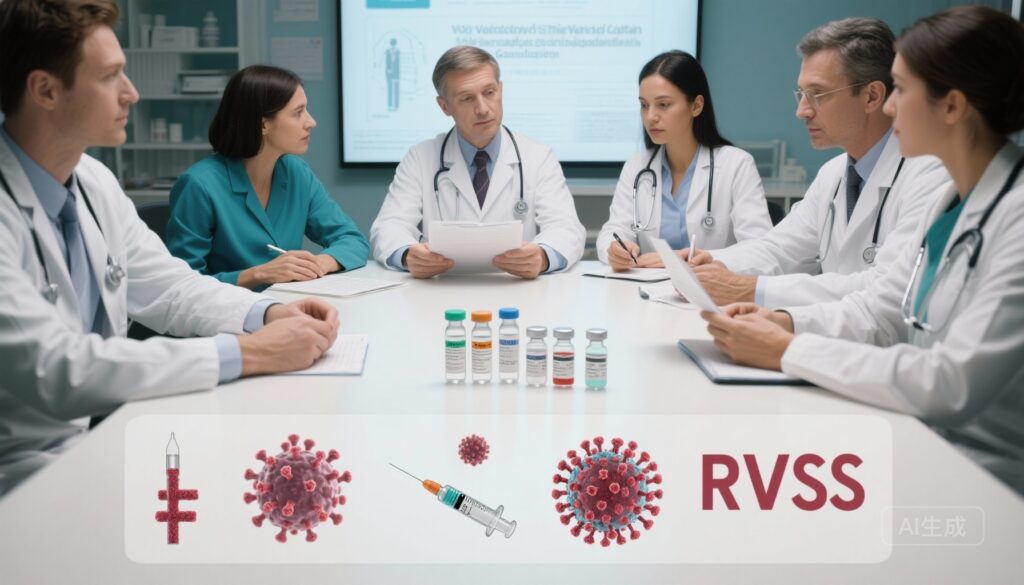Introduction and Context
The Infectious Diseases Society of America (IDSA) released updated guidance in 2025 that strengthens recommendations for influenza and respiratory syncytial virus (RSV) vaccination in people with weakened immune systems. The guidance, published online in JAMA (doi:10.1001/jama.2025.19738), reflects a focused evidence review of recent vaccine effectiveness and safety studies that enrolled immunocompromised participants. The panel reviewed 17 influenza studies and 5 RSV studies published after August 2023 and August 2024, respectively, and issued practical recommendations intended to reduce severe respiratory disease and deaths in a population at high risk of complications.
This update matters because immunocompromised people — including recipients of organ transplants, patients receiving cancer chemotherapy or biologic immunomodulators, and people with primary immunodeficiency or advanced HIV — have higher risks of severe influenza and RSV disease, prolonged viral shedding, and poorer vaccine responses. Newer vaccine formulations (for example, high-dose or adjuvanted influenza vaccines and recently licensed RSV immunizations for older adolescents and adults) plus accumulating safety data created an opportunity to clarify optimal vaccine choices and timing for this vulnerable group.
New Guideline Highlights
Key recommendations from the IDSA panel are straightforward and actionable:
– Annual influenza vaccination is recommended for all immunocompromised persons aged >6 months. Where feasible, high-dose or adjuvanted influenza vaccines should be used for immunocompromised people rather than standard-dose formulations.
– A single dose of an RSV vaccine is suggested for all immunocompromised adolescents and adults. For children with immunocompromise, the panel recommends individualized decisions made jointly by parents and treating clinicians.
– Live-attenuated influenza vaccine (LAIV, e.g., FluMist) is not recommended for immunocompromised persons, and household contacts of severely immunocompromised patients should avoid LAIV due to potential transmission of the vaccine virus.
– Timing adjustments are advised around planned immunosuppressive therapies and transplantation: vaccinate before starting profound immunosuppression whenever possible; when vaccination before treatment is not feasible, clinicians should weigh benefits and antibody response timing and may delay certain vaccinations until after immune recovery.
– Household members and close contacts should be up to date with influenza and RSV vaccinations to create a cocooning effect.
– Concurrent administration of COVID-19, influenza, and RSV vaccines is acceptable and safe.
These recommendations are backed by the panel’s evaluation that serious adverse events attributed to either vaccine in immunocompromised participants were exceedingly rare in the reviewed literature.
Updated Recommendations and Key Changes
What is new or different compared with common practice and prior guidance?
– Expanded endorsement of high-dose or adjuvanted influenza vaccines across the full spectrum of immunocompromise: Previously, high-dose influenza vaccine had been recommended primarily for older adults (eg, age >=65). IDSA now advises that immunocompromised persons of nearly all ages (>6 months) receive high-dose or adjuvanted formulations when available, citing studies that showed improved immunogenicity and, in some analyses, better clinical protection in populations with weakened immune responses.
– Explicit recommendation for RSV vaccination in immunocompromised adolescents and adults: RSV vaccines for older adults became available in 2023–2024 after pivotal phase 3 trials. IDSA’s update recommends one dose for immunocompromised adolescents and adults, reflecting the greater risk of severe RSV in this group and favorable safety/effectiveness signals.
– Reinforcement of household immunization and coadministration guidance: The panel reiterates that vaccinating close contacts reduces exposure risk and that giving COVID-19, influenza, and RSV vaccines at the same visit is acceptable, simplifying clinic logistics.
Evidence driving these changes includes immunogenicity and effectiveness data specific to immunocompromised subgroups and post-licensure surveillance of RSV vaccine safety in older adults. The IDSA committee noted that while direct head-to-head randomized trials comparing vaccine formulations in every immunocompromised subgroup are limited, the preponderance of observational and controlled evidence supports preferential use of enhanced influenza formulations to increase the likelihood of protective responses.
Topic-by-Topic Recommendations
Below are practical, topic-specific recommendations distilled from the IDSA update.
Who should be vaccinated?
– All immunocompromised persons aged >6 months should receive annual inactivated influenza vaccine, preferably high-dose or adjuvanted formulations when available.
– All immunocompromised adults and adolescents should be offered a single dose of an approved RSV vaccine.
– For immunocompromised children, RSV vaccination should be considered on a case-by-case basis in consultation with the child’s clinician.
Choice of vaccine and contraindications
– Influenza: Use inactivated influenza vaccines in immunocompromised patients. Prefer high-dose (eg, Fluzone High-Dose) or adjuvanted formulations (eg, Fluad) where available. Avoid LAIV (intranasal FluMist) for immunocompromised patients and for household members of severely immunocompromised people due to theoretical risk of vaccine virus transmission.
– RSV: Use licensed RSVPreF vaccines authorized for older adolescents and adults. Follow manufacturer age indications and local approvals; in pediatric populations, consider expert consultation.
Timing in relation to immunosuppression and transplantation
– Ideally administer indicated vaccines before initiation of significant immunosuppressive therapy. When feasible, give inactivated vaccines at least 2 weeks before starting immunosuppressive regimens; more time is preferable to allow a full immune response.
– For planned organ transplantation, complete recommended vaccines before transplantation. If vaccination must occur after transplantation, clinicians should generally wait until immune function has partially recovered (commonly 3–6 months post-transplant for many inactivated vaccines), per transplant infectious disease guidance; the IDSA panel emphasized individualized timing.
– For patients receiving B-cell depleting therapies (eg, anti-CD20 agents) or intensive chemotherapy, expect blunted vaccine responses and consider timing vaccines during periods of maximal immune recovery where possible.
Dosing and revaccination
– Influenza: Annual vaccination is required. Use seasonal formulation each year.
– RSV: Current IDSA guidance suggests a single dose for eligible immunocompromised adolescents and adults; future recommendations may change as further data accumulate.
Safety and coadministration
– The IDSA review found effectively no elevated risk of serious vaccine-related adverse events in immunocompromised participants across the evaluated studies.
– Coadministration of COVID-19, influenza, and RSV vaccines is acceptable and convenient; spacing is not required for inactivated vaccines.
Household members
– Household contacts and close caregivers should be current with influenza and RSV vaccinations to reduce transmission risk to immunocompromised persons; LAIV should be avoided in household members of severely immunocompromised patients.
Recommendation Strength and Evidence Grading
The IDSA panel framed recommendations based on a systematic review of available evidence. While the panel used expert consensus where direct evidence was incomplete, several recommendations are stronger where direct data (immunogenicity or clinical effectiveness in an immunocompromised subgroup) exist. Clinicians should interpret the guidance considering local availability of enhanced influenza formulations and RSV vaccine licensure by age.
– Strong recommendation (panel believes benefits clearly outweigh risks): Annual inactivated influenza vaccination for all immunocompromised persons; RSV vaccination for immunocompromised adults/adolescents; avoidance of LAIV in immunocompromised patients.
– Conditional recommendation (use with individualized decision-making): RSV vaccination for children with immunocompromise; specific timing around certain immunomodulatory therapies when evidence is limited.
Expert Commentary and Insights
Committee perspectives distilled from the guideline discussion highlight several practical and conceptual points:
– Prioritizing enhanced flu vaccines for immunocompromised patients is a pragmatic step to improve protection in the face of suboptimal immune responses. Experts acknowledged that direct head-to-head clinical endpoint trials across all immunocompromised subgroups are lacking, but the combination of immunogenicity improvements and observational effectiveness data supports preferential use.
– RSV vaccination in immunocompromised adults and adolescents is a welcome addition given the high burden of severe RSV disease in frail populations. Experts noted uncertainties about long-term durability of protection and whether future booster doses will be needed.
– Timing remains a frequent clinical dilemma. The panel emphasized individualized timing that considers the specific immunosuppressive agent, expected depth and duration of immune suppression, and urgency of starting therapy. For many patients, vaccinating before therapy or transplant is feasible and advantageous.
– Implementation challenges include vaccine supply, insurance coverage for enhanced influenza formulations in younger immunocompromised adults and for RSV vaccines in some jurisdictions, and coordinating vaccination timing across subspecialists.
Controversies and research needs noted by the panel
– Evidence gaps remain for pediatric RSV vaccination in diverse immunocompromised conditions.
– The optimal strategy for boosting RSV vaccine immunity in patients with ongoing immunosuppression is unknown.
– Comparative effectiveness trials of enhanced influenza formulations in specific immunocompromised subgroups would strengthen future guidance.
Practical Implications for Clinical Practice
What should clinicians do tomorrow?
– Review immunization status of all immunocompromised patients during routine visits and proactively plan annual influenza vaccination using high-dose or adjuvanted products when available.
– Offer an approved RSV vaccine to immunocompromised adolescents and adults and discuss individualized decisions for pediatric patients with caregivers.
– Coordinate vaccination timing with oncologists, transplant teams, and other specialists before planned immunosuppression when possible.
– Educate household contacts to stay current with influenza and RSV vaccines and avoid LAIV when caring for severely immunocompromised patients.
– Use the opportunity of clinic visits to provide coadministration of COVID-19, influenza, and RSV vaccines when indicated to reduce missed opportunities.
Short clinical vignette
– Maria is a 58-year-old woman with rheumatoid arthritis who will start rituximab in 4 weeks. She has not yet had this season’s influenza vaccine and is RSV vaccine–eligible. Per IDSA guidance, vaccinate Maria now with an inactivated high-dose or adjuvanted influenza vaccine before rituximab to maximize immune response, and offer the RSV vaccine at the same visit. If she had already begun rituximab recently, the team would discuss that vaccine responses may be blunted and weigh the timing of vaccination relative to her next rituximab cycle.
References
1. Infectious Diseases Society of America. Updated Recommendations for Influenza and Respiratory Syncytial Virus (RSV) Vaccination in Immunocompromised Persons. JAMA. Published online November 14, 2025. doi:10.1001/jama.2025.19738.
2. Centers for Disease Control and Prevention. Who Should and Who Should Not Get a Flu Vaccine. https://www.cdc.gov/flu/prevent/vaccine.htm. Accessed November 2025.
3. Centers for Disease Control and Prevention. Contraindications and Precautions: Live, Attenuated Influenza Vaccine (LAIV). https://www.cdc.gov/vaccines/vpd/flu/public/index.html. Accessed November 2025.
4. U.S. Food and Drug Administration. FDA Approves RSV Vaccines. https://www.fda.gov/vaccines-blood-biologics. Accessed November 2025.
5. Centers for Disease Control and Prevention. Interim Clinical Considerations for Use of COVID-19 Vaccines. Guidance on coadministration with other vaccines. https://www.cdc.gov/vaccines/covid-19/clinical-considerations/interim-considerations-us.html. Accessed November 2025.
(Readers seeking the full guideline text and evidence tables should consult the JAMA publication linked above and IDSA’s website for downloadable guidance documents and implementation tools.)
Conclusion
The IDSA 2025 update represents a meaningful shift toward more aggressive prevention of influenza and RSV in immunocompromised patients by prioritizing enhanced influenza formulations and recommending RSV vaccination for adolescents and adults with immunocompromise. The guidance emphasizes individualization — especially around timing near immunosuppressive treatments — and stresses household immunization and vaccine coadministration to simplify care. Clinicians should incorporate these recommendations into routine care pathways to reduce the disproportionate burden of severe respiratory infections in people with weakened immune systems.




This article reviews the 2025 update of the Infectious Diseases Society of America (IDSA) recommendations regarding influenza and RSV vaccination for immunocompromised populations, providing a comprehensive evidence-based perspective for clinical application.
Study Design:
The guideline update is based on a systematic review of evidence published after August 2023, including recent high-quality randomized controlled trials (RCTs), large-scale prospective cohorts, and safety surveillance databases. It further incorporates expert consensus for areas where empirical evidence is limited. The recommendations specifically address subpopulations such as solid organ transplant recipients, patients receiving chemotherapy or biologics, those with primary immunodeficiency, and advanced HIV, with stratification by age and clinical context.
Level of Evidence:
The recommendations are supported by a hierarchy of evidence, led by RCTs and validated real-world data analyses, supplemented by expert opinion to strengthen areas with lower direct evidence. As such, the guideline achieves a high evidence grade, facilitating stronger and more operational recommendations for clinicians compared to previous editions based on fewer or less robust studies.
Key Findings:
Annual inactivated influenza vaccination is strongly recommended for virtually all immunocompromised individuals (≥6 months), with a clear preference for high-dose or adjuvanted formulations (e.g., high-dose Fluzone, Fluad).
RSV vaccination is advised for all immunocompromised adolescents and adults; pediatric indications are to be individualized according to risk and available data.
The use of live attenuated influenza vaccine (LAIV) is contraindicated in immunocompromised individuals, and close contacts of severely immunosuppressed people should also avoid LAIV to minimize risk of viral transmission.
“Cocooning” strategies—encouraging universal flu and RSV vaccination among household members and close contacts—are highlighted to provide indirect protection for the immunocompromised.
Co-administration with COVID-19 vaccines is deemed safe and operationally efficient, without the need for spacing doses.
Timing of vaccine administration should ideally precede initiation of immunosuppressive therapy, with adjustments when ongoing therapy cannot be postponed.
Data demonstrate that high-dose and adjuvanted vaccines confer better immunogenicity and clinical outcomes in immunocompromised hosts, with no major safety concerns reported.
Clinical Implications:
The 2025 IDSA update streamlines clinical pathways for high-risk patients and provides actionable guidance for optimizing individual and household protection. Its practical orientation (e.g., co-administration of vaccines, clear contraindications, family-based prevention) can help clinicians proactively screen, educate, and vaccinate vulnerable groups, effectively mitigating severe influenza and RSV morbidity and mortality.
Ongoing Clinical Issues:
Not all recommended vaccines (e.g., high-dose formulations, RSV vaccines) are universally available or affordable, with policy and supply challenges remaining, particularly outside the US.
There are limited direct data for some populations, such as immunocompromised children, necessitating shared decision-making and multidisciplinary coordination.
Heterogeneity of immune impairment, disease subtypes, and medication regimens still leaves important gaps in risk stratification and evidence tailoring; more direct comparative RCTs and large-scale implementation studies are warranted for these subgroups.
Future Research Directions:
Continued head-to-head RCTs and real-world effectiveness studies should clarify vaccine performance across various immunosuppressed populations and immunosuppression regimens. Research on durability of immunity and timing of booster administration, especially for RSV and emerging respiratory pathogens, is needed. Further work should address cost-effectiveness, safety in less-studied pediatric and rare disease cohorts, and best practices for broadening vaccine access and uptake.
In summary, this IDSA guideline update represents a significant advancement in the prevention of severe influenza and RSV infections among immunocompromised individuals, supporting stronger, simplified, and more comprehensive care and public health strategies. Successful translation into practice will depend on interdisciplinary cooperation, continued surveillance, and health policy alignment.